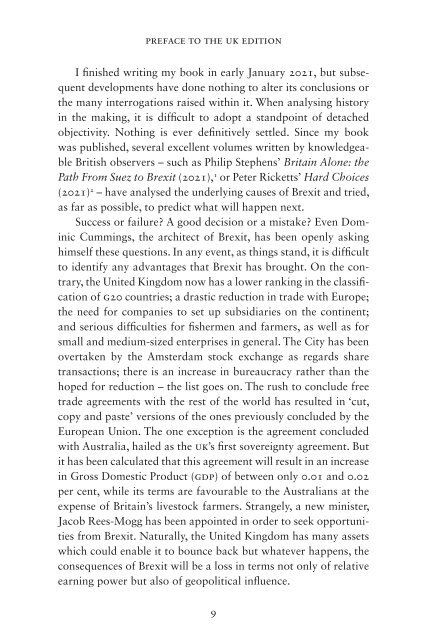Au Revoir Britannia by Sylvie Bermann sampler
From her unique perspective as former French ambassador to the UK, Sylvie Bermann examines the mistruths told by politicians surrounding the fateful 2016 Brexit referendum. Au Revoir Britannia asks the question ‘How did this happen?’ and exposes what she sees as the ‘unrepenting’ and ‘inveterate’ lies of the now pm, Boris Johnson. This first English edition includes a new preface exploring the future of post-Brexit Europe and Britain, and the uncertain implications of the Russian invasion of Ukraine.
From her unique perspective as former French ambassador to the UK, Sylvie Bermann examines the mistruths told by politicians surrounding the fateful 2016 Brexit referendum. Au Revoir Britannia asks the question ‘How did this happen?’ and exposes what she sees as the ‘unrepenting’ and ‘inveterate’ lies of the now pm, Boris Johnson. This first English edition includes a new preface exploring the future of post-Brexit Europe and Britain, and the uncertain implications of the Russian invasion of Ukraine.
Create successful ePaper yourself
Turn your PDF publications into a flip-book with our unique Google optimized e-Paper software.
preface to the uk edition<br />
I finished writing my book in early January 2021, but subsequent<br />
developments have done nothing to alter its conclusions or<br />
the many interrogations raised within it. When analysing history<br />
in the making, it is difficult to adopt a standpoint of detached<br />
objectivity. Nothing is ever definitively settled. Since my book<br />
was published, several excellent volumes written <strong>by</strong> knowledgeable<br />
British observers – such as Philip Stephens’ Britain Alone: the<br />
Path From Suez to Brexit (2021), 1 or Peter Ricketts’ Hard Choices<br />
(2021) 2 – have analysed the underlying causes of Brexit and tried,<br />
as far as possible, to predict what will happen next.<br />
Success or failure? A good decision or a mistake? Even Dominic<br />
Cummings, the architect of Brexit, has been openly asking<br />
himself these questions. In any event, as things stand, it is difficult<br />
to identify any advantages that Brexit has brought. On the contrary,<br />
the United Kingdom now has a lower ranking in the classification<br />
of G20 countries; a drastic reduction in trade with Europe;<br />
the need for companies to set up subsidiaries on the continent;<br />
and serious difficulties for fishermen and farmers, as well as for<br />
small and medium-sized enterprises in general. The City has been<br />
overtaken <strong>by</strong> the Amsterdam stock exchange as regards share<br />
transactions; there is an increase in bureaucracy rather than the<br />
hoped for reduction – the list goes on. The rush to conclude free<br />
trade agreements with the rest of the world has resulted in ‘cut,<br />
copy and paste’ versions of the ones previously concluded <strong>by</strong> the<br />
European Union. The one exception is the agreement concluded<br />
with <strong>Au</strong>stralia, hailed as the UK’s first sovereignty agreement. But<br />
it has been calculated that this agreement will result in an increase<br />
in Gross Domestic Product (GDP) of between only 0.01 and 0.02<br />
per cent, while its terms are favourable to the <strong>Au</strong>stralians at the<br />
expense of Britain’s livestock farmers. Strangely, a new minister,<br />
Jacob Rees-Mogg has been appointed in order to seek opportunities<br />
from Brexit. Naturally, the United Kingdom has many assets<br />
which could enable it to bounce back but whatever happens, the<br />
consequences of Brexit will be a loss in terms not only of relative<br />
earning power but also of geopolitical influence.<br />
9


















